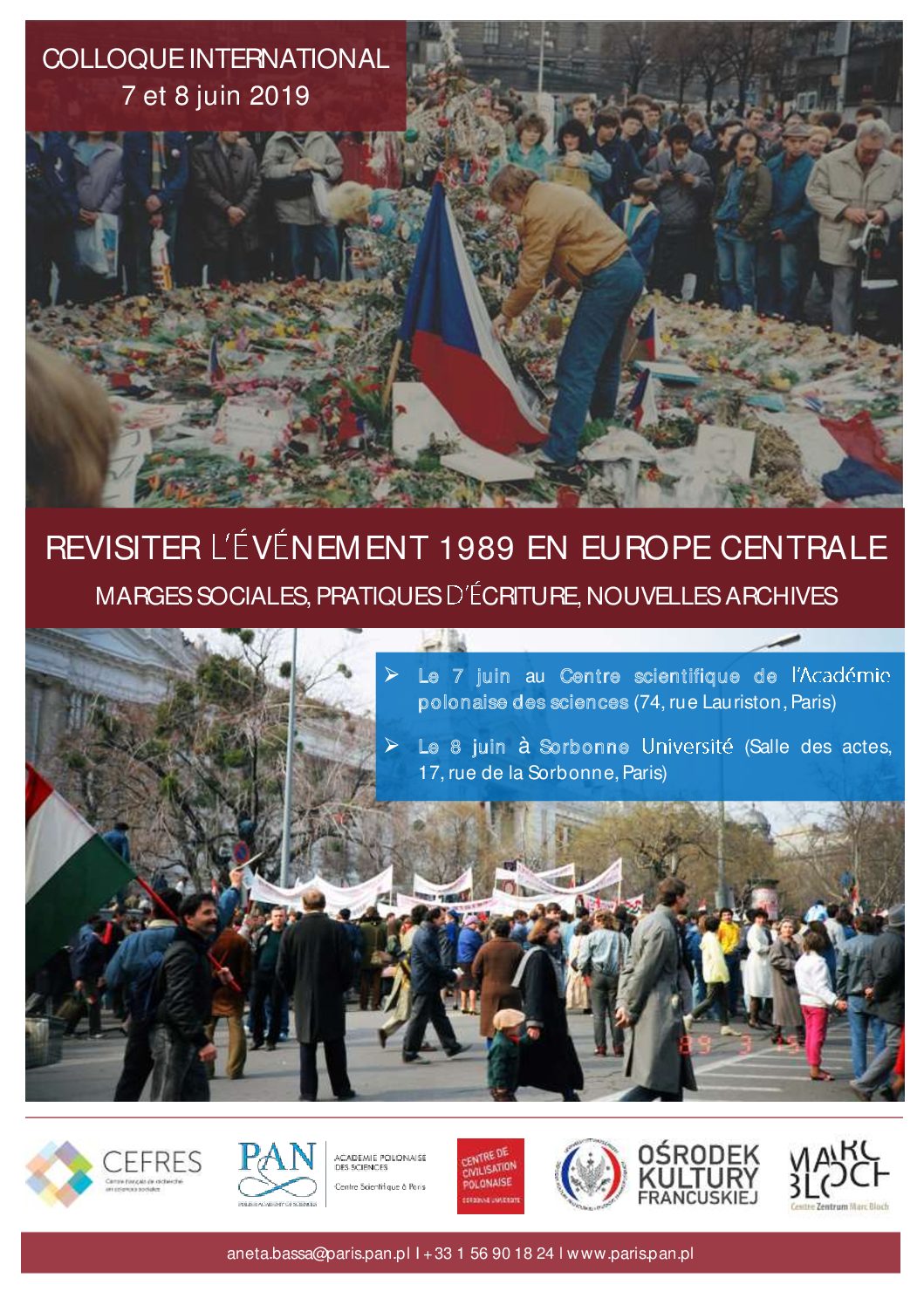Mezinárodní konference
Místo: Vědecké centrum Polské akademie věd (rue Lauriston 74, Paříž), Sorbonne Univerzita (rue de la Sorbonne 17, “Salle des actes”, Paříž)
Datum: 7.-8. června 2019
Organizers: Vědecké centrum Polské akademie věd v Paíži, Centrum polské civilizace (Sorbonne Univerzita), CEFRES, Centrum francouzské civilizace a frankofonních studií ve Varšavě
Jazyk: angličtina
Tato událost je první z cyklu konferencí nazvaného “1989-2019: Beyond the Anniversary, questionning 1989“. Konference se budou konat v Paříži, Varšavě a Praze.
Podrobný program naleznete zde.
Popis (EN)
What is known about 1989, this chain of major events that have shaken up the map of Europe and the world? The collapse of communist regimes has been extensively studied and commented on. The human and social sciences have long focused on the 1989 enigma, which saw the un-anticipated collapse of the European part of the Soviet bloc in just a few months. However, the work on 1989 quickly led to other research agendas, proposing to study the current transformations in Central and Eastern Europe. Because contrary to what the large number of stories about 1989 may suggest, there are few empirical studies on this object and for good reasons. Because of its historical situation as the final moment of the communist period and as the inaugural moment of the “democratic transition”, 1989 was finally little addressed as such and for itself. Retrospective analyses of the reasons for the fall of the communist bloc and prospective studies on the democratization of Eastern European societies quickly marginalized the event as an object of investigation, in favor of more interpretation-oriented writings. More recently, it is more a questioning around the memory controversies on 1989 that has caught the attention of researchers. This conference therefore proposes a return to the event itself. Going back to the field, diving in the past, mobilizing new sources, without of course sacrificing the analysis to pure facts. This is the perspective adopted which consists in questioning the event through its social margins, actors who have until now remained in the shadows (for example workers or women), through writing and cultural practices and by engaging in a debate on the archives of 1989, raising new or too long ignored questions. Several leads seem to be possible:
- 1989 and social margins : What did 1989 mean for the Eastern European working classes, rural communities, people living in urban areas far from the heart of events, women, young people or the regime’s elites? Crossing the political event and the social worlds offers an original perspective on the dynamics of the collapse and makes it possible to rethink the relationships between the “revolutionary process” and social classes, which are known to be central to Marxist theory.
- Writing and cultural practices : How was 1989 figured, documented and co-constructed, both during and after, through various writing practices (diaries, actors’ memoirs, underground press, samizdats, correspondence) and artistic genres such as literature, theatre, happening, painting or documentary? What traces does it leave in the visual memory of the event? What exactly is described, from what point of view?
- New archives : Which archives were constituted on 1989 and on the period preceding the event? Are the archives on 1989 part of the archives of communism? Did 1989 produce its own archivists? Who are they and how can these archives be used? How can we interpret the development of oral history in the East and the multiplication of real “banks of testimonies”, which are emerging as new archives of communism and post-communism?
It is therefore about revisiting 1989 by consciously taking a fragmented look on the series of political events that have transformed Central and Eastern Europe. Hence the use of new and heterodox sources: oral history with ordinary citizens, self-writing, memoirs written by former members of the opposition or communist parties, posters, literary and artistic materials, etc., which have been the subject of so few publications since then.
Vědecké vedení Cyklu konferencí
- Maciej Forycki, Vědecké centrum Polské akademie věd v Paříži
- Jérôme Heurtaux, ředitel CEFRESu
- Nicolas Maslowski, Centrum pro francouzská studia (CCFEF), Univerzita ve Varšavě
- Paweł Rodak, Centrum polské civilizace (Sorbonne Univerzita)

